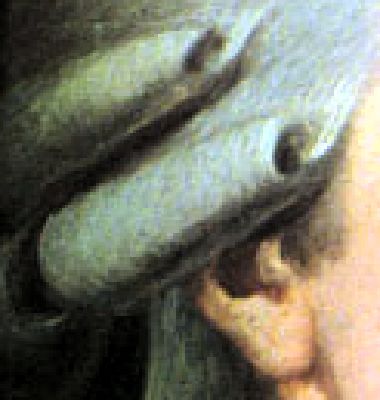|
<<< << -- 4 -- Thomas Larson HIDE AND SEEK -- >> >>>

Which music in Krafft's portrayal does she intend us to hear? Perhaps it's the entertaining Mozart of the serenades and divertimenti. The John-Phillip-Sousa Mozart of the German dances and cassations. The Tin-Pan-Alley Mozart of the Italian arias. The juvenile Mozart of the toilet humor and butt jokes. The Amadeus movie-Mozart, the celluloid image not unlike Krafft's single frame, an actor in buckled shoes staked to depravity, sexual and otherwise, who must endure Salieri's rules and his poisoned cup. Cue the Haffner Symphony and roll the credits. What I want to know is where does Mozart's obliging transparency come from? And then, thinking of the Mozart tourists, who are lining up right now to tour his birth home in Salzburg, enraptured by little Wolfie and his feet dangling above the pedals, who are buying Krafft's portrait on a postcard, I get stuck. I get stuck on Krafft because she may have groked the adulterous side of Mozart's genius. In a word, his persona. In her rendering, there is a reluctant truth: he is the one-dimensional dandy I don't want him to be. In her, he is maddeningly untroubled, Mozartean to the bone. And why not. All of us hear this Sunday in the park quality, bicycling through him. It is accessible and sincere, without effort or guile. It's a quality in passing in Brahms and never in Stravinsky. (Brahms always sounds Brahmsian, which is to say nurturing a grand effect that, to our delight, he seems incapable of curbing, such as the opening movement of the Violin Concerto.)
Does that easy-sounding Mozart, then, allow us to hear the well resound, what we his pure-at-heart lovers swear by: his contrapuntal, orchestral, and operatic adventure? In the Jupiter Symphony. In the Haydn Quartets, especially K464. In what a friend calls the 'tragic passion' of the G minor String Quintet and the Piano Concerto in D minor, No 20. In the harrowing pulled-down-to-Hell combat, 'Don Giovanni, a cenar teco m-invitasti', of Don Giovanni's penultimate scene. Tuned to those astonishing pieces, is it even fair to contrast their emotional ardor with the croquet-play of Eine Kleine Nachtmusik? How could it be fair? And why? Why comparison shop? On rare occasions does Mozart combine felicity and the fiend, such as in the opening Allegro spiritoso of the Piano Concerto in C minor, No 24. The angrily leaping melody, the rifle shots between soloist and orchestra, the maniacal cadenza (at least in the version I prize: pianist Robert Casadeus with George Szell and the Cleveland Orchestra, 12 January 1954), are contrasted by the piano's second theme, as though Mozart, unsettled by his own impetuosity, needed to calm himself down. (The subsequent Larghetto sounds even more placid than normal.) Taking his compositions together, his brooding masterworks, like this concerto, are consistently inconsistent. But what do we learn by separating them from his beloved hits? Weren't the latter the means by which Mozart liberated himself from the puerile excesses of his own talent?

A detail from Barbara Krafft's portrait of Mozart
|
All this, I think, begins to dethrone Mozart from the untouchable, to bring him down closer to be one of us, un-divine. In Opera As Drama, while discussing The Magic Flute, Joseph Kerman wrote, 'Mozart never saw man's will as inevitably opposed by the will of God. He conceived an essential harmony expressed by human feelings; his terms were brotherhood and sympathy and humility, not damnation and defiance' (123). Here is a mensch, who is not belligerent like Beethoven, who is not ruthless like his father. This Mozart is of the chamber not of the cloister. While Bach wrote for God's glory, Mozart wrote for ours. His music is not interested in God, but rather in human perfectibility. His self-development is spiritually ascendant without being religious. At the end of his long-short life, Mozart joined the Freemasons, a polytheistic and benevolent group who had briefly supported him and his family with money and lodging. Their beliefs echoed his -- the rights of man, liberty, tolerance, the significance of reason, the necessity of love. His egalitarian writing, which emphasizes balanced voices and passionate restraint, is Masonic in its dedication to and demonstration of the most difficult democratic concept of the Enlightenment, brotherhood.
Continue >>
Copyright © 8 April 2007
Thomas Larson, California USA

|

